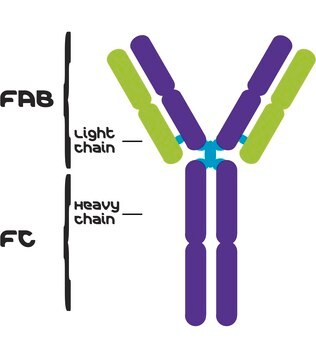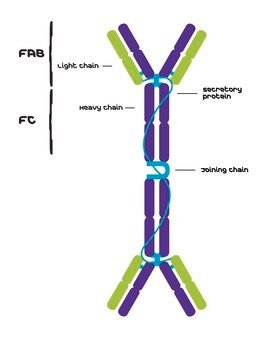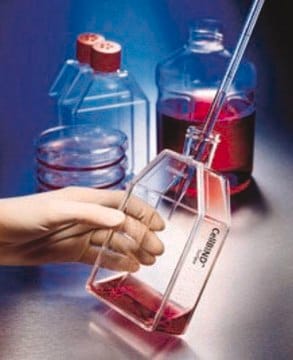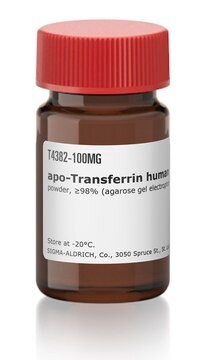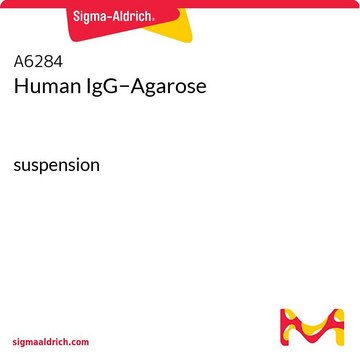A2691
Anti-Human IgA (α-chain specific)−Agarose antibody produced in goat
affinity isolated antibody, adsorbed with mouse and rat IgG
Synonim(y):
Kozie anty-ludzkie IgA
Zaloguj sięWyświetlanie cen organizacyjnych i kontraktowych
About This Item
Polecane produkty
pochodzenie biologiczne
goat
białko sprzężone
agarose conjugate
forma przeciwciała
affinity isolated antibody
rodzaj przeciwciała
secondary antibodies
klon
polyclonal
Formularz
PBS suspension
reaktywność gatunkowa
human
spodziewany brak reakcji z
rat, mouse
pojemność
3-4 mg/mL binding capacity (human IgA)
temp. przechowywania
2-8°C
docelowa modyfikacja potranslacyjna
unmodified
Powiązane kategorie
Opis ogólny
Binding Capacity: One mL of antibody binds 3-4 mg human IgA. Elution Capacity is 2-4 mg/mL.
IgA antibody plays an essential role in mucosal immunity. It has shown to bind immunogens/pathogens to restrict them from entering the mucosal membrane. The Anti-Human IgA (α-chain specific) product increases sensitivity to human IgA without cross-reactivity to other substances. Offering minimal interspecies cross reactivity to mouse or a rat, making it ideal for use in screening antibodies produced by a hybridoma cells containing a mouse or a rat immunoglobulins.
Immunogen
IgA produced from transformed cell line of human Epstein-Barr virus.
Zastosowanie
Affinity chromatography using anti-human IgA antibody linked to agarose was performed to purify proteins from 2E9IgA1 transfectant cells.
Anti-Human IgA (α-chain specific)-Agarose antibody produced in goat has been used in affinity chromatography and quantitative enzyme linked immunosorbent assay (ELISA).
Postać fizyczna
Suspension in 0.01 M phosphate buffered saline, pH 7.4, containing 15 mM sodium azide
Oświadczenie o zrzeczeniu się odpowiedzialności
Unless otherwise stated in our catalog or other company documentation accompanying the product(s), our products are intended for research use only and are not to be used for any other purpose, which includes but is not limited to, unauthorized commercial uses, in vitro diagnostic uses, ex vivo or in vivo therapeutic uses or any type of consumption or application to humans or animals.
Ta strona może zawierać tekst przetłumaczony maszynowo.
Nie możesz znaleźć właściwego produktu?
Wypróbuj nasz Narzędzie selektora produktów.
Kod klasy składowania
10 - Combustible liquids
Klasa zagrożenia wodnego (WGK)
WGK 3
Temperatura zapłonu (°F)
Not applicable
Temperatura zapłonu (°C)
Not applicable
Wybierz jedną z najnowszych wersji:
Masz już ten produkt?
Dokumenty związane z niedawno zakupionymi produktami zostały zamieszczone w Bibliotece dokumentów.
Susanne Wolbank et al.
Journal of virology, 77(7), 4095-4103 (2003-03-14)
We have previously generated human monoclonal anti-human immunodeficiency virus type 1 (anti-HIV-1) antibodies 2F5IgG and 2G12IgG with an exceptional cross-clade neutralizing potential. 2F5IgG and 2G12IgG passively administrated to macaques were able to confer complete protection from both intravenous and mucosal
Poor ex vivo induction of T-cell responses to idiotype or tumor cell lysate-pulsed autologous dendritic cells in advanced pre-treated multiple myeloma
Garderet L, et al.
Leukemia & Lymphoma, 47(7), 1340-1347 (2006)
Suckow MA, et al.
The Laboratory Rat (2005)
Y J Wen et al.
Blood, 97(6), 1750-1755 (2001-03-10)
Multiple myeloma (MM) is a B-cell malignancy. The monoclonal immunoglobulin, secreted by myeloma plasma cells, carries unique antigenic determinants (idiotype [Id]) that can be regarded as a tumor-specific antigen. Id-based immunotherapy has been explored in myeloma patients for the purpose
J Berdoz et al.
Proceedings of the National Academy of Sciences of the United States of America, 96(6), 3029-3034 (1999-03-17)
The hallmark of a mucosal immune response is the production of antigen-specific secretory IgA (S-IgA) antibodies in external secretions. S-IgA consists of ten polypeptides produced in two different cell lineages. The heavy and light chains in plasma cells assemble into
Nasz zespół naukowców ma doświadczenie we wszystkich obszarach badań, w tym w naukach przyrodniczych, materiałoznawstwie, syntezie chemicznej, chromatografii, analityce i wielu innych dziedzinach.
Skontaktuj się z zespołem ds. pomocy technicznej
